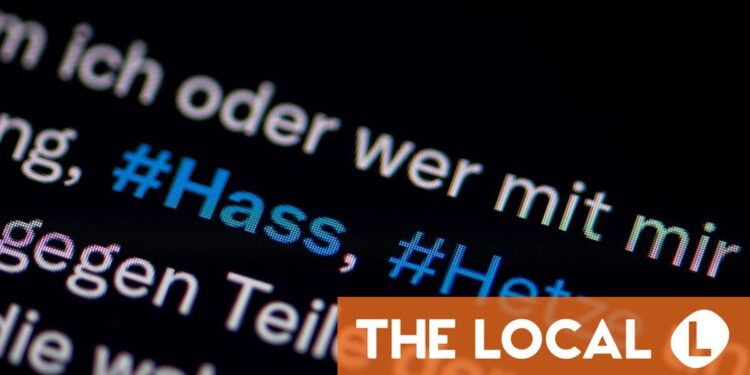Insulting someone is not a crime, and criminalizing speech is going to put real strain on European-US relationships.
This is Orwellian, and everyone in Europe and the US must reject this lunacy. https://t.co/WZSifyDWMr
— JD Vance (@JDVance) February 17, 2025
Interestingly, contrary to the US Vice President’s claims, the freedom of expression index compiled by the Varieties of Democracy (V-Dem) project, ranked Germany 11th in the world when it comes to freedom of expression with a score that was slightly higher than the US (ranked 17th) as of 2023.
So what are the rules around freedom of speech in Germany?
‘There shall be no censorship’
It’s generally understood that freedom of speech is valued and protected in Germany.
German Basic Law (Grundgesetz) clearly says as much in Article 5 (paragraph 1): “Every person shall have the right freely to express and disseminate his opinions in speech, writing and pictures…There shall be no censorship.”
Although the next line adds that these rights have ‘limits” which are spelled out in further laws, and “in provisions for the protection of young persons and in the right to personal honour”.
Advertisement
Hate speech is a crime
One notable limit to free speech in Germany is anything considered hate speech.
Hateful speech that targets specific groups of people (especially based on their race, ethnicity or religion) or which glorifies the Holocaust, or denies the fact that it happened, is considered incitement to hatred (Volksverhetzung) and is punishable.
As Sonja Eichwede, a legal policy spokeswoman for the SPD parliamentary group, previously told The Local, this extends to using “slogans of anti-constitutional organisations, [or] calling for or condoning criminal acts against certain groups of people”.
For this reason, regional far-right Alternative for Germany (AfD) leader Björn Höcke has been charged and fined for using Nazi party slogans in his speeches.
While these rules put a certain limit on free speech, they are generally understood to be necessary in Germany, given the historical events which ultimately led to the Holocaust when hateful speech and propaganda was used to incite hatred and then violence against Jewish people and other minorities.
READ ALSO: FACT CHECK – Are people punished for using Nazi slogans in Germany?
Sections 86 and 86a of Germany’s penal code ban online or offline distribution of “flags, insignia, uniforms, slogans and forms of greeting” that belong to known anti-constitutional groups – which is why doing a Nazi salute is a punishable offence in the Bundesrepublik.
Personal insult and online hate speech
Germany’s hate speech laws can also be applied to comments online, and these laws have been strengthened as online hate speech has been perceived to be a growing threat.
Advertisement
As German prosecutors explained in their interview with CBS, in some cases people are surprised to learn that their comments online are criminal.
Publicly insulting someone online, as well as spreading malicious gossip, violent threats and fake quotes can all be prosecuted in Germany. Repeat offenders could potentially face jail time, but in most cases judges apply fines or confiscate electronic devices like smartphones as a punishment.
These protections were tightened after the murder of Walter Lübcke, a politician with the centre-right Christian Democrats who had become the victim of a barrage of hate speech when he publicly defended then-Chancellor Angela Merkel’s immigration policies.
Germany has since ramped up task forces to crack down on internet hate speech. There are 16 units across the country, some of which investigate thousands of cases each year.
Watchdog groups warn that Germany censors certain acts of protest
Criticism of how Germany enforces its limits to freedom of expression doesn’t only come from right-wing perspectives.
Amidst ongoing protests against Israel’s attacks in Gaza, pro-Palestine activists have complained that Germany is unfairly prosecuting certain speech and expression.
For example, the Düsseldorf Administrative Court upheld a ban on the phrase “From the river to the sea”. Some German authorities have argued that the phrase qualifies as incitement to hatred (against Israel), whereas pro-Palestine protestors contend that the phrase is a call for the liberation of an oppressed people.
Watchdog group CIVICUS warned at the end of 2023 that the German government was failing to “protect its citizens’ freedoms of expression”. A report by CIVICUS Monitor cited disproportionate measures used against pro-Palestine protestors and the climate justice group Last Generation in particular.
Advertisement
Is the US really a bastion of free speech?
US law also contains some basic limits to free speech, such as slander and libel laws that are aimed at preventing individuals from saying or writing false defamatory statements. But it lacks the more robust protections against hate speech, aloud or online, that Germany has enshrined.
Free speech maximalists argue that the right to say anything – good, bad or ugly as it may be – should be staunchly protected. And the US is often held up as an example of a country that maintains this unfettered freedom of expression.
The Trump administration, however, has already made some efforts to silence or suppress certain speech. On the same day that Vice President Vance chastised Europe for what he saw as unfair censorship, the White House barred all Associated Press (AP) journalists from accessing the Oval Office and Air Force One because the AP decided not to refer to the Gulf of Mexico as the “Gulf of America” as Trump has declared it should be called.
Source link : http://www.bing.com/news/apiclick.aspx?ref=FexRss&aid=&tid=67b8c5bf3fe941489d738702fdb0b270&url=https%3A%2F%2Fwww.thelocal.de%2F20250221%2Ffact-check-is-it-fair-to-say-that-germany-doesnt-have-a-right-to-free-speech&c=10004406123649585570&mkt=de-de
Author :
Publish date : 2025-02-21 02:59:00
Copyright for syndicated content belongs to the linked Source.


